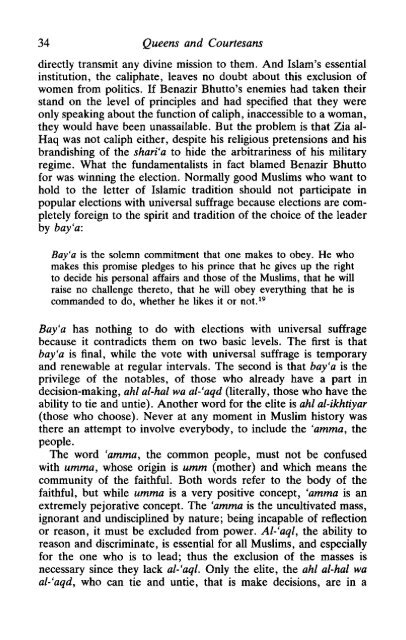Fatima.Mernessi_The-Forgotten-Queens-of-Islam-EN
Fatima.Mernessi_The-Forgotten-Queens-of-Islam-EN
Fatima.Mernessi_The-Forgotten-Queens-of-Islam-EN
Create successful ePaper yourself
Turn your PDF publications into a flip-book with our unique Google optimized e-Paper software.
34 <strong>Queens</strong> and Courtesans<br />
directly transmit any divine mission to them. And <strong>Islam</strong>'s essential<br />
institution, the caliphate, leaves no doubt about this exclusion <strong>of</strong><br />
women from politics. If Benazir Bhutto's enemies had taken their<br />
stand on the level <strong>of</strong> principles and had specified that they were<br />
only speaking about the function <strong>of</strong> caliph, inaccessible to a woman,<br />
they would have been unassailable. But the problem is that Zia al-<br />
Haq was not caliph either, despite his religious pretensions and his<br />
brandishing <strong>of</strong> the shari'a to hide the arbitrariness <strong>of</strong> his military<br />
regime. What the fundamentalists in fact blamed Benazir Bhutto<br />
for was winning the election. Normally good Muslims who want to<br />
hold to the letter <strong>of</strong> <strong>Islam</strong>ic tradition should not participate in<br />
popular elections with universal suffrage because elections are completely<br />
foreign to the spirit and tradition <strong>of</strong> the choice <strong>of</strong> the leader<br />
by bay'a:<br />
Bay'a is the solemn commitment that one makes to obey. He who<br />
makes this promise pledges to his prince that he gives up the right<br />
to decide his personal affairs and those <strong>of</strong> the Muslims, that he will<br />
raise no challenge thereto, that he will obey everything that he is<br />
commanded to do, whether he likes it or not. 19<br />
Bay'a has nothing to do with elections with universal suffrage<br />
because it contradicts them on two basic levels. <strong>The</strong> first is that<br />
bay'a is final, while the vote with universal suffrage is temporary<br />
and renewable at regular intervals. <strong>The</strong> second is that bay'a is the<br />
privilege <strong>of</strong> the notables, <strong>of</strong> those who already have a part in<br />
decision-making, ahl al-hal wa al-'aqd (literally, those who have the<br />
ability to tie and untie). Another word for the elite is ahl al-ikhtiyar<br />
(those who choose). Never at any moment in Muslim history was<br />
there an attempt to involve everybody, to include the 'amma, the<br />
people.<br />
<strong>The</strong> word 'amma, the common people, must not be confused<br />
with umma, whose origin is umm (mother) and which means the<br />
community <strong>of</strong> the faithful. Both words refer to the body <strong>of</strong> the<br />
faithful, but while umma is a very positive concept, 'amma is an<br />
extremely pejorative concept. <strong>The</strong> 'amma is the uncultivated mass,<br />
ignorant and undisciplined by nature; being incapable <strong>of</strong> reflection<br />
or reason, it must be excluded from power. Al-'aql, the ability to<br />
reason and discriminate, is essential for all Muslims, and especially<br />
for the one who is to lead; thus the exclusion <strong>of</strong> the masses is<br />
necessary since they lack al-'aql. Only the elite, the ahl al-hal wa<br />
al-'aqd, who can tie and untie, that is make decisions, are in a


